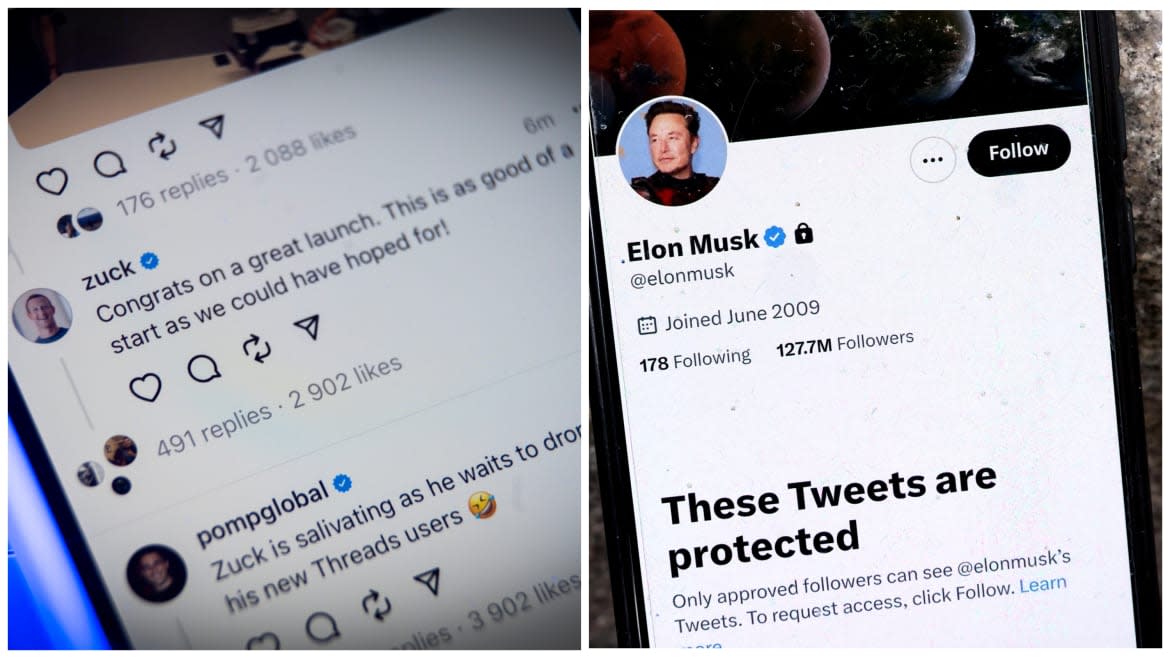Twitter Panics Over Threads’ Ascent, Threatens to Sue

Meta’s Twitter clone, Threads, has amassed a giant user base in less than a day, and Twitter’s top brass are evidently spooked.
Soon after the launch, a Twitter attorney accused Meta of the “systematic, willful, and unlawful misappropriation of Twitter’s trade secrets and other intellectual property,” in a letter to Mark Zuckerberg obtained by Semafor.
The lawyer, Alex Spiro—a close Musk confidante—added that Twitter “reserves all rights, including, but not limited to, the right to seek both civil remedies and injunctive relief without further notice to prevent any further retention, disclosure, or use of its intellectual property by Meta.”
By Thursday morning, more than 30 million people had signed up for Threads, according to Zuckerberg. As of the middle of last year, Twitter had 238 million monthly active users.
Spiro claimed that a roster of ex-Twitter staffers with “access to Twitter’s trade secrets and other highly confidential information” had facilitated Meta’s alleged theft. A spokesperson for Meta disputed that allegation. “No one on the Threads engineering team is a former Twitter employee — that’s just not a thing,” he said.
Reached for comment, Twitter auto-replied with a poop emoji but did not otherwise respond. On Twitter, Musk said of the legal threat, “Competition is fine, cheating is not.”
Threads Could Kill Twitter Because It Adopts the Best Ideas
If Twitter does sue, it may face an uphill legal battle, said Jonathan D’Silva, assistant professor of clinical law at Penn State Law and a specialist in intellectual property issues. “If they’re alleging trade secret misappropriation, there is nothing in trade secret law that says that you can’t reverse engineer a trade secret.”
The question, D’Silva said, is whether Meta was able to mimic Twitter’s functionality “by cheating,” such as leveraging ex-employees’ confidential information. It seems unlikely that Meta would have done that, he added, since “most companies of any sophistication know better,” lest they expose themselves to a “slam dunk” lawsuit.
Meta has been accused of ripping off rivals before, including Snapchat’s “stories” feature and TikTok’s short videos. But imitation is not necessarily unlawful, said Sharon Sandeen, director of the Intellectual Property Institute at Mitchell Hamline School of Law. “Everything that is noticeable to Twitter users would not be a trade secret,” she said. As for Twitter’s claims about Meta’s supposed wrongdoing, she continued, “there’s not much detail in that letter.”
D’Silva largely concurred, noting that while Twitter’s potential legal case would come down to details, in general, “there’s only so many ways you can put a button on the screen.”
Get the Daily Beast's biggest scoops and scandals delivered right to your inbox. Sign up now.
Stay informed and gain unlimited access to the Daily Beast's unmatched reporting. Subscribe now.

 Yahoo News
Yahoo News 
